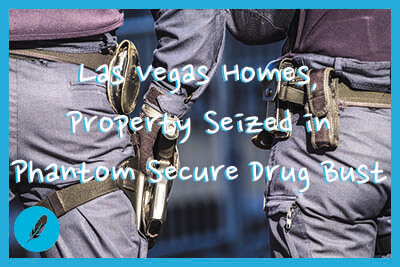Las Vegas Homes, Property Seized in Phantom Secure Drug Bust
- Access to licensed treatment centers
- Information on treatment plans
- Financial assistance options

Encrypted phones and other electronic devices have increasingly been a mainstay for drug dealers, drug traffickers, and drug cartels, allowing them to communicate about drops, exchanges, money matters, and more without detection. It’s long been a problem that has stumped law enforcement, including interrupting their ability to successfully prosecute in a case of two killings in Australia and enabling the Mexican Sinaloa cartel – until now.
Vincent Ramos, the CEO of Phantom Secure, is accused of creating the gutted and super encrypted smartphones exploited by criminals to evade detection. In an investigation that spanned multiple countries, included more than 250 law enforcement agents from a number of governments, and resulted in more than two dozen homes and offices owned by Phantom Secure being raided.
Christopher Wray is the director of the FBI. In a statement, he said: “The indictment of Vincent Ramos and his associates is a milestone against transnational crime.”
Of the 20,000 encrypted devices in circulation, the FBI estimates that about half are being used for nefarious purposes. These devices are estimated to have generated more than $80 million in the past eight years and contributed to the destruction of countless lives.
In a truly unique case, Ramos has been charged with conspiracy in aiding and abetting the distribution of drugs as well as racketeering conspiracy. Multiple properties and bank accounts have been seized in Las Vegas, and about 150 domains have been taken down as part of the Phantom network as well.
According to a heavily redacted complaint filed against Ramos and his organization, it is not easy for new customers to get an encrypted device through the company though their websites advertised their services as being appropriate for any executive or business. Rather, it was necessary for a prospective customer to first be referred by a current customer and then submit to a background check, all the while being vetted through an anonymous process that involved somewhat incriminating code names that customers would reportedly choose for themselves – names that reportedly included things like “the.killa” or “knee_capper9” or “the.cartel.” Once approved, the phones can only be used to communicate with other phones unless special permission is requested, a request that is only granted if the other user is also on an encrypted network.
Does your insurance cover treatment for alcohol and/or drug addiction?
Check your insurance coverage or text us your questions to learn more about treatment by American Addiction Centers (AAC).
Should someone be arrested with one of the phones or if a phone is otherwise compromised in terms of security, a request could allegedly be turned into the company requesting that it be erased of all incriminating information. In order to maintain these services for six months, a customer might pay anywhere from $2,000 to $3,000.
The system is set up to avoid any interference of law enforcement, but a few of the phones reportedly were secured by investigators during the course of different drug cases. In February of last year, Ramos met with a number of undercover officers pretending to be high-level drug traffickers in Las Vegas. They laid plain their organization and its purpose, even letting Ramos know that they would be in need of GPS tracking so they could find informants who had turned and kill them.
According to the complaint, Ramos responded, “Right, right, right, right,” and later promised that their devices would be able to avoid detection and could not be hacked by anyone, including law enforcement. The undercover agents reportedly spent $20,000 for six months’ worth of service across 10 devices. Some of those phones have been used in various drug busts here in the US and abroad.
Despite the fall of Silk Road and the takedown of Phantom Secure, there is still a great deal of work to be done when it comes to blocking the “dark web” and stopping the encrypted communications that cover the actions of drug cartels and dangerous people trafficking drugs around the world.
In the meantime, communities like Las Vegas that continue to struggle under the weight of addiction and families that are paying a personal toll due to the disease have one option: connect with treatment services that will help them to build a life far outside the criminal world that is killing tens of thousands of people every year.
Are you ready to find out more about getting sober and getting safe?